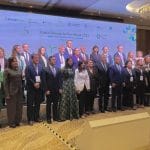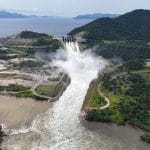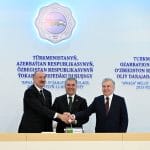Oil prices increased on September 3 after slow recovery for US Gulf Coast exports from hurricane Ida earlier this week and the decision by the Organization of the Petroleum Exporting Countries and allies, known as OPEC+ to keep the increase in production to 400,000 barrels per day over the next few months.
“The main reason for the increase in the oil price is the decision by OPEC+ to keep the increase in production to 400,000 barrels per day, despite the call by President (Joe) Biden to increase it further to bring prices down. It is unlikely that the hurricane will have any further lingering effects,” Charles Ellinas, senior fellow at the Global Energy Center, Atlantic Council, told New Europe on September 3.
OPEC+ based this on its forecast for a 4.2 million barrels per day growth in global demand next year, he said. “Given lingering problems with Covid-19 and the Delta-variant, some consider this optimistic. However, given that (the International Monetary Fund) IMF now expects global economic growth in 2022 to be greater than its earlier forecast, 4.9% instead of 4.4%, OPEC+ may yet be proved right. If that happens, and oil inventories keep falling, prices may hover within the $70-80 per barrel range,” Ellinas said.
Once key oil producers restore output to pre-Covid levels, prices may reach $55 to $60 a barrel, Russian Deputy Energy Minister Pavel Sorokin told the Izvestia newspaper on the sidelines of the Eastern Economic Forum in the Russian city of Vladivostok taking place from September 2-4. “If there are no shocks, we believe that the equilibrium [oil] price will stand between $55 and $60,” the newspaper quoted Sorokin as saying, according to Sputnik.
On September 3, Brent crude futures were up 40 cents, or 0.6%, to $73.43 a barrel at 1105 GMT, while US West Texas Intermediate (WTI) crude futures were up 14 cents or 0.2% at $70.13 a barrel, Reuters reported, adding that about 1.7 million barrels per day of oil production remains shut in the US Gulf of Mexico, with damage to heliports and fuel depots slowing the return of crews to offshore platforms.
US oil giant Exxon Mobil is tapping the US Strategic Petroleum Reserve with more than 90% of the Gulf of Mexico’s oil production still shut after the hurricane, while Louisiana’s refineries are still reeling from the impact of the storm, Bloomberg reported, noting that the market appears set to remain in deficit even as OPEC+ push ahead with reviving supply.
At the 20th OPEC and non-OPEC Ministerial Meeting (ONOMM), which was held via videoconference, on September 1, ministers noted that, while the effects of the Covid-19 pandemic continue to cast some uncertainty, market fundamentals have strengthened and OECD stocks continue to fall as the recovery accelerates.
OPEC+ ministers welcomed the positive performance of Participating Countries in the Declaration of Cooperation (DoC). Overall conformity to the production adjustments was 110% in July including Mexico (109% without Mexico), reinforcing the trend of high conformity by Participating Countries, OPEC said in a press release.
In view of current oil market fundamentals and the consensus on its outlook, OPEC+ ministers reaffirmed the decision of the 10th OPEC and non-OPEC Ministerial meeting on April 12, 2020 and further endorsed in subsequent meetings, including the 19th ONOMM on July 18, 2021, OPEC said.
They reconfirmed the production adjustment plan and the monthly production adjustment mechanism approved at the 19th ONOMM and the decision to adjust upward the monthly overall production by 0.4 million barrels per day for the month of October 2021.
Ministers also extended the compensation period until the end of December 2021 as requested by some underperforming countries and request that underperforming countries submit their compensation plans by September 17. “Compensation plans should be submitted in accordance with the statement of the 15th ONOMM,” OPEC said.
Finally, the ministers reiterated the critical importance of adhering to full conformity and to the compensation mechanism, taking advantage of the extension of the compensation period until the end of December 2021.
Ministers agreed to hold the 21st OPEC and non-OPEC Ministerial Meeting on October 4.
follow on twitter @energyinsider






